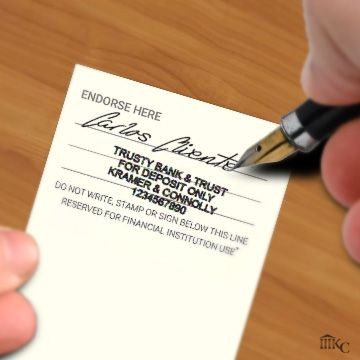The Lawyer's Lawyer
Endorsing at a Distance
Q. Hit by the wave of COVID-19 layoffs, my client is desperate for money and calls often to see if her settlement check arrived. It just came in today's mail, jointly payable to us both. Since I can't have her visit to endorse it herself, may I sign it for her?
A. Without a valid Power of Attorney, or "POA," your powers as an attorney don't go that far.
As her lawyer, you may represent this client in court, negotiate settlements, and sign pleadings in your own name. But this doesn't entitle you to sign her name to checks, affidavits or other instruments.
To get proper authorization, you could have your client sign a limited POA. Most states require that these instruments be notarized and signed in the presence of witnesses. Yet, even where remote notarization is permitted, you're still likely to need two competent witnesses for it to be valid. So while it may still be possible to get a POA, this may be easier said than done in light of social distancing constraints.
Postponing the disbursement of funds isn't an option either. The rules require that you "deliver promptly to the client ... any funds or other property that the client ... is entitled to receive." If you don't, your delay will likely infuriate this client and prompt a legitimate grievance against you for failing to expedite her net recovery. Of course, you could always send the unsigned check to the client for endorsement, but giving a large check to a financially-strapped client is a risk I wouldn't recommend.
Rather than fuss with POAs, many plaintiff's lawyers are comfortable endorsing checks if their clients have given them written permission to do so. Although some states have even frowned on using POAs for this purpose, these attorneys reason that, if they place the funds into trust as authorized, no one would have any cause for complaint. After all, this would expedite the disbursement of the proceeds to a client in desperate need of funds. No harm. No foul.
Personally, I'm inclined to agree. If you handle the funds correctly, your prompt action to disburse them would seem to satisfy your ethical duty to your client. But I don't speak for the disciplinary authorities in your jurisdiction. However unlikely, overly aggressive bar counsel might characterize your signature as a "forged endorsement" and seek to sanction you for fraudulent or criminal misconduct.
Such charges would punish lawyers for expediting payments to their clients. This would be particularly draconian in light of the unprecedented challenges posed by the COVID-19 crisis. But, without precedent, those who improvise to overcome these challenges must do so at their own risk.
